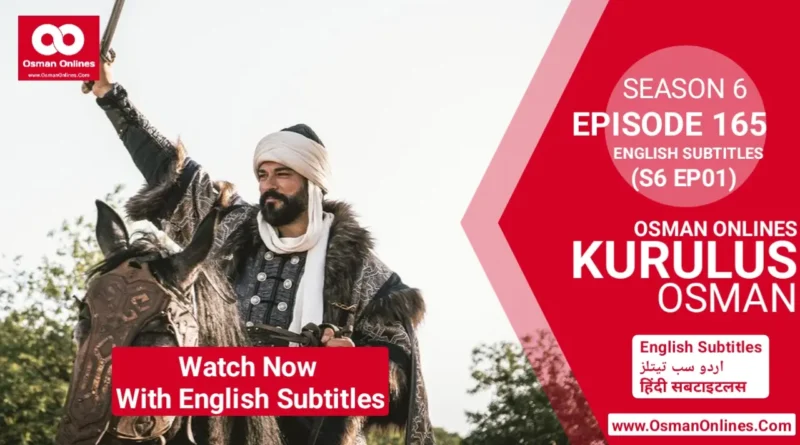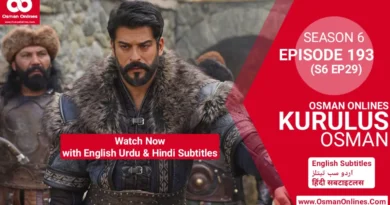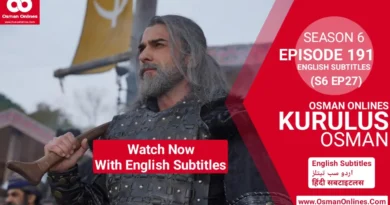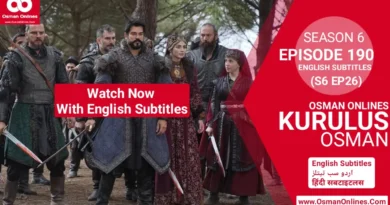Kurulus Osman Chapter 165: A Historical Turning Point in the Rise of Osman Bey
Kurulus Osman Chapter 165: A Historical Turning Point in the Rise of Osman Bey
Kurulus Osman Chapter 165: A Historical Turning Point in the Rise of Osman Bey
The epic journey of the Kayı tribe continues to unfold in Kurulus Osman Chapter 165, a chapter filled with political intrigue, spiritual symbolism, and the relentless determination of Osman Bey to unite the Turkish beyliks under a single banner. This stage of the story highlights not only Osman’s vision of building a state but also the challenges he faces from both allies and enemies. For readers of history and admirers of medieval Anatolia, this chapter provides a rich blend of cultural, political, and emotional dimensions that reflect the real struggles of leadership and unity.
Osman Bey’s Call for Allegiance from the Turkish Beys
At the heart of Kurulus Osman Chapter 165 lies Osman Bey’s determination to consolidate power. His dream is not merely to defend his tribe but to create a unified Turkish front against foreign powers that threaten the borders. Osman Bey calls upon the influential beyliks of the frontier to pledge loyalty to his cause. Among those responding to this call are Bayhan Bey and Begüm Hatun longtime rivals whose choices will have lasting consequences.
- Bayhan Bey stands as a powerful figure with military strength.
- Begüm Hatun, though traditionally seen as an opponent, carries her own network of influence.
- Both are drawn into Osman’s vision, yet their motivations remain uncertain.
The question raised here is not simply political loyalty it is also personal. Osman Bey’s daughter, Fatma Hatun, becomes the subject of marriage alliances, further intertwining matters of state with matters of family.
The Arrival of Emir Ömer, the Vizier of the Caliph
Another dramatic highlight of Kurulus Osman Chapter 165 is the unexpected arrival of Emir Ömer, the trusted vizier of the Caliph. His presence in the frontier lands is kept secret, creating a sense of suspense and uncertainty. Neither Osman Bey nor the surrounding beyliks fully understand the reasons behind his visit, and this secrecy fuels speculation.
Historically, the viziers of the Caliphate held great authority, often influencing the balance of power in different regions. In this chapter, Emir Ömer symbolizes both opportunity and danger. While his authority may strengthen Osman Bey’s claim to leadership, it also brings new questions about loyalty, legitimacy, and hidden agendas.
The Mystery of the Sacred Relics
One of the most striking themes in Kurulus Osman Chapter 165 is the revelation that sacred relics have been stolen. Emir Ömer shares this sensitive information with Karesi Bey, raising alarms across the frontier. The sacred relics, viewed as symbols of divine protection and legitimacy, are central to the unity of the people.
Karesi Bey immediately begins searching for answers:
| Key Question | Possible Implication |
|---|---|
| Who stole the relics? | Could signify betrayal from within the Turkish tribes or outside interference. |
| Why were they stolen? | To weaken Osman Bey’s growing influence and credibility. |
| Where are they hidden? | The relics may already be in enemy hands, strengthening opposition forces. |
This situation tests the trust among the beyliks, forcing Osman Bey and his allies to act decisively.
Commander Lucas and the Byzantine Strategy
The Byzantine Empire, cornered by Osman Bey’s continuous conquests, turns to its last hope—Commander Lucas. In Kurulus Osman Chapter 165, Lucas emerges as a cunning strategist, using not only military might but also deceptive rhetoric of “justice” and “mercy” to manipulate the frontier population.
Lucas manages to secure the stolen sacred relics, using them as leverage against the Turks. His arrival is carefully staged to win sympathy, but behind the façade lies a dangerous plan to weaken Osman Bey’s authority and divide the unity of the tribes.
Here, the chapter highlights a recurring theme in history: foreign powers exploiting internal divisions for their gain.
Holofira and Orhan Bey: A Crossroads of Fate
Another emotionally charged subplot in Kurulus Osman Chapter 165 revolves around Holofira, who once had close ties with the Kayı tribe. Commander Lucas, aware of her connections, tries to persuade her to join his side. Holofira’s decision becomes critical—not only for her personal destiny but also for Orhan Bey, Osman’s son.
This encounter raises several questions:
- Will Holofira betray her past bonds or remain loyal?
- How will fate reunite her path with Orhan Bey’s?
- Can personal choices alter the course of political struggles?
Their storyline adds depth to the narrative, showing how love, loyalty, and destiny often collide in times of conflict.
Alaeddin Bey in Grave Danger
The most dramatic personal test for Osman Bey in Kurulus Osman Chapter 165 comes with the fate of his son, Alaeddin Bey. During an attempted conquest, Alaeddin is trapped inside the enemy fortress and used as a human shield against his father’s advancing forces. This ruthless tactic puts Osman in a painful dilemma should he risk his son’s life for victory, or retreat and lose momentum?
This scene underscores the heavy burden of leadership. Osman Bey must balance his duty as a father with his duty as a leader, a recurring struggle in both history and epic storytelling.
Themes of Leadership and Unity in Chapter 165
Beyond its events, Kurulus Osman Chapter 165 highlights several recurring themes that reflect Osman Bey’s journey:
- Unity over Division – The call for allegiance shows that survival depends on collective strength.
- Faith and Legitimacy – The stolen sacred relics symbolize the role of spiritual authority in political power.
- Family and State – Personal relationships, such as Fatma Hatun’s marriage prospects or Alaeddin’s captivity, intertwine with statecraft.
- Deception vs. Truth – Figures like Commander Lucas use rhetoric to mask hidden agendas, while Osman strives for honesty and justice.
These themes make the chapter not only entertaining but also educational for readers of history.
Key Quotes from Kurulus Osman Chapter 165
- “A leader does not seek power for himself, but for the unity of his people.”
- “Sacred relics are not mere treasures they are the spirit of our faith and identity.”
- “An enemy who comes with sweet words may be more dangerous than one who comes with a sword.”
Such lines capture the wisdom embedded in the narrative, reminding readers of the values that shaped the early Turkish state.
Key Takeaways
- Osman Bey’s leadership vision continues to grow, demanding allegiance from Turkish beyliks.
- Emir Ömer’s arrival brings both hope and uncertainty.
- The theft of sacred relics raises the stakes of loyalty and legitimacy.
- Commander Lucas embodies foreign manipulation and strategic deceit.
- The personal stories of Fatma Hatun, Holofira, Orhan Bey, and Alaeddin Bey enrich the political drama.
Frequently Asked Questions (FAQ)
The central theme revolves around unity, leadership, and the challenges Osman Bey faces in consolidating power among the Turkish beyliks.
Commander Lucas is a Byzantine officer who represents the empire’s final strategy against Osman Bey, using deception and manipulation rather than open conflict.
They symbolize divine legitimacy and moral authority. Their theft undermines trust and creates instability in the frontier.
Alaeddin’s captivity forces Osman to face a painful choice between family loyalty and his duty as a leader, showing the human side of his struggles.
It blends personal dilemmas, spiritual symbolism, and political strategy, making it a pivotal point in the broader story of Osman Bey’s rise.
Conclusion
Kurulus Osman Chapter 165 is more than just a continuation of Osman Bey’s saga it is a pivotal chapter that brings together political intrigue, personal sacrifice, and spiritual symbolism. Through struggles with rival beyliks, the arrival of Emir Ömer, the theft of sacred relics, and the schemes of Commander Lucas, the chapter paints a vivid picture of the challenges of leadership. At the same time, the personal stories of Fatma Hatun, Holofira, Orhan, and Alaeddin remind us that behind every great leader lies a network of family, allies, and destiny.
For history enthusiasts and readers fascinated by the foundation of the Ottoman state, this chapter provides not only dramatic storytelling but also insights into the values of unity, justice, and perseverance that shaped an empire.




